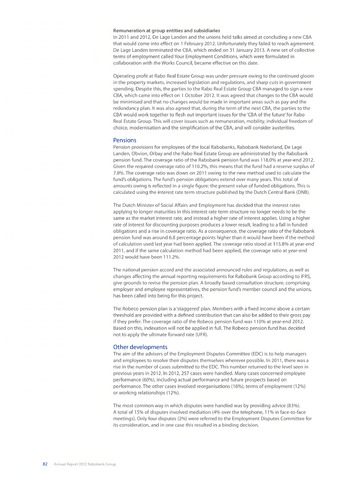Pensions
Other developments
Remuneration at group entities and subsidiaries
In 2011 and 2012, De Lage Landen and the unions held talks aimed at concluding a new CBA
that would come into effect on 1 February 2012. Unfortunately they failed to reach agreement.
De Lage Landen terminated the CBA, which ended on 31 January 2013. A new set of collective
terms of employment called Your Employment Conditions, which were formulated in
collaboration with the Works Council, became effective on this date.
Operating profit at Rabo Real Estate Group was under pressure owing to the continued gloom
in the property markets, increased legislation and regulations, and sharp cuts in government
spending. Despite this, the parties to the Rabo Real Estate Group CBA managed to sign a new
CBA, which came into effect on 1 October 2012. It was agreed that changes to the CBA would
be minimised and that no changes would be made in important areas such as pay and the
redundancy plan. It was also agreed that, during the term of the next CBA, the parties to the
CBA would work together to flesh out important issues for the 'CBA of the future'for Rabo
Real Estate Group. This will cover issues such as remuneration, mobility, individual freedom of
choice, modernisation and the simplification of the CBA, and will consider austerities.
Pension provisions for employees of the local Rabobanks, Rabobank Nederland, De Lage
Landen, Obvion, Orbay and the Rabo Real Estate Group are administrated by the Rabobank
pension fund. The coverage ratio of the Rabobank pension fund was 118.0% at year-end 2012.
Given the required coverage ratio of 110.2%, this means that the fund had a reserve surplus of
7.8%. The coverage ratio was down on 2011 owing to the new method used to calculate the
fund's obligations. The fund's pension obligations extend over many years.This total of
amounts owing is reflected in a single figure: the present value of funded obligations. This is
calculated using the interest rate term structure published by the Dutch Central Bank (DNB).
The Dutch Minister of Social Affairs and Employment has decided that the interest rates
applying to longer maturities in this interest rate term structure no longer needs to be the
same as the market interest rate, and instead a higher rate of interest applies. Using a higher
rate of interest for discounting purposes produces a lower result, leading to a fall in funded
obligations and a rise in coverage ratio. As a consequence, the coverage ratio of the Rabobank
pension fund was around 6.8 percentage points higher than it would have been if the method
of calculation used last year had been applied. The coverage ratio stood at 115.8% at year-end
2011, and if the same calculation method had been applied, the coverage ratio at year-end
2012 would have been 111.2%.
The national pension accord and the associated announced rules and regulations, as well as
changes affecting the annual reporting requirements for Rabobank Group according to IFRS,
give grounds to revise the pension plan. A broadly based consultation structure, comprising
employer and employee representatives, the pension fund's member council and the unions,
has been called into being for this project.
The Robeco pension plan is a 'staggered' plan. Members with a fixed income above a certain
threshold are provided with a defined contribution that can also be added to their gross pay
if they prefer. The coverage ratio of the Robeco pension fund was 110% at year-end 2012.
Based on this, indexation will not be applied in full. The Robeco pension fund has decided
not to apply the ultimate forward rate (UFR).
The aim of the advisers of the Employment Disputes Committee (EDC) is to help managers
and employees to resolve their disputes themselves wherever possible. In 2011, there was a
rise in the number of cases submitted to the EDC. This number returned to the level seen in
previous years in 2012. In 2012, 257 cases were handled. Many cases concerned employee
performance (60%), including actual performance and future prospects based on
performance. The other cases involved reorganisations (16%), terms of employment (12%)
or working relationships (12%).
The most common way in which disputes were handled was by providing advice (83%).
A total of 15% of disputes involved mediation (4% over the telephone, 11 in face-to-face
meetings). Only four disputes (2%) were referred to the Employment Disputes Committee for
its consideration, and in one case this resulted in a binding decision.
82 Annual Report 2012 Rabobank Group

